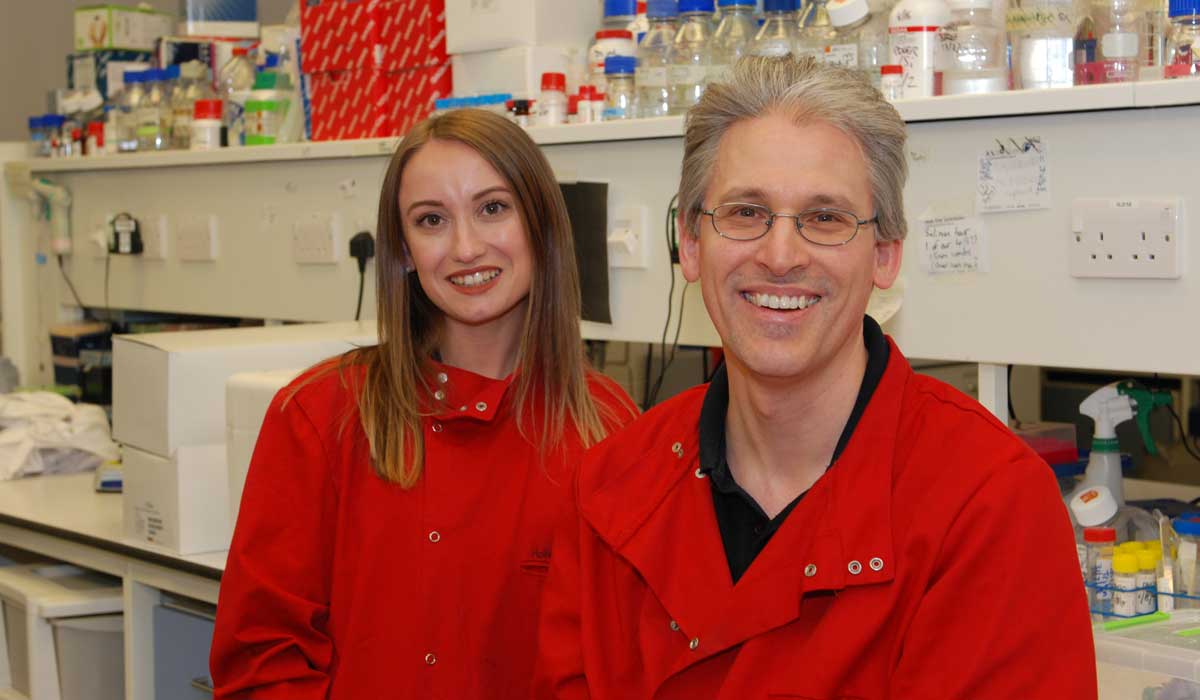Huddersfield scientists analyse new synthetic chemical which causes brain tumour cells to regress and die
 PhD researcher Hollie Griffiths and Dr Simon Allison undertook the analysis of the KHS101 molecule on the glioblastoma cells
PhD researcher Hollie Griffiths and Dr Simon Allison undertook the analysis of the KHS101 molecule on the glioblastoma cellsScientists have discovered a synthetic chemical that encourages brain tumour cells to ‘self-destruct’ and die whilst leaving healthy brain cells untouched.
The study, published in Science Translational Medicine, found that when an experimental chemical, a molecule named KHS101, was introduced in laboratory tests on aggressive glioblastoma cancer cells, the cells would lose their capability to produce energy and eventually perish.
Glioblastomas are the most common of cancerous brain tumours and are known for their aggressive growth. Only about five per cent of glioblastoma patients survive for five years after diagnosis and it is recognised that new treatment options need to be developed.
The study, led by Dr Heiko Wurdak at the University of Leeds, was joined by specialists from a number of institutions including cancer biologist Dr Simon Allison from the University of Huddersfield.
KHS101 discovery
Cellular science
The KHS101 discovery represents an exciting breakthrough and although the work is in its early stages, it could pave the way for further research leading to the development of more effective therapies for treatment of glioblastoma brain tumours.
His role in this study was to help establish how the glioblastoma cells self-destructed after coming into contact with KHS101.
“We saw that the cells rapidly developed a high number of very large vacuoles, and this is usually a sign that the cells are in distress. However, we had to be sure that it was not a form of regenerative process, where the cell would regress, then grow again.”
“We found that the cells’ mitochondrial respiration and glycolysis was restricted, which halted the glioblastoma cells’ energy supply needed for their growth and survival. Eventually, the cells died altogether.”
Dr Allison was joined in his work by Huddersfield researcher Hollie Griffiths, who is using the study towards her PhD which is focused on investigation of metabolic vulnerabilities of cancer cells.
The KHS101 discovery represents an exciting breakthrough and although the work is in its early stages, it could pave the way for further research leading to the development of more effective therapies for treatment of glioblastoma brain tumours.
“This is just the start. I think everyone involved in this project has really enjoyed the interdisciplinary collaborative nature of it. It’s exciting because the study opens up new scientific questions and has created fantastic collaborations bringing together different areas of research expertise. We are all looking forward to some close collaborative research going forward and our scientific journey continues.”
- Polson et al., KHS101 disrupts energy metabolism in human glioblastoma cells and reduces tumor growth in mice. Sci. Transl. Med. 10, eaar2718 (2018)
Related News
New compound destroys hard-to-treat cancer cells
A new chemical compound has been developed by Huddersfield scientists with potential to destroy hard-to-treat cancer cells
New cancer treatments for young people
Research into cancer destroying protein molecule CD40 is being focused to fight cancer in young people
State-of-the-art science lab for A-level students
The new super lab is a first at a UK university and will give young scientists in the region the opportunity to use cutting-edge facilities
